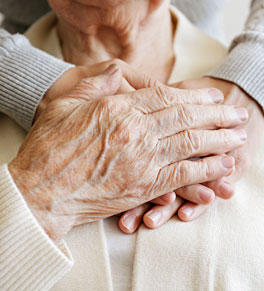Making important end-of-life decisions

“People need to discuss their wishes and priorities with their family so everyone knows what to do in the case of a catastrophic event,” says UCI Health geriatrician Dr. Solomon Liao.
Death is inevitable, a fact of life that everyone will experience. Yet conversations about the end of life are difficult — if they happen at all.
But avoiding discussing and planning for death can lead to shock, anger and depression when the end is near, says UCI Health geriatrician Dr. Solomon Liao, director of Palliative Care Services.
“The biggest misunderstanding that I see among patients, families and even health professionals around the issue of death is that we think we can control it,” Liao told HuffPost.
“We believe that with all of our machines, technology and medications, we can determine when or even if that happens.”
Making decisions before it's too late
Because death will come, he says the most important step people can take long before they are incapacitated is to designate a person they trust to make decisions when they are unable to speak for themselves.
“People need to discuss their wishes and priorities with their family so everyone knows what to do in the case of a catastrophic event,” Liao says.
UCI Health has a number of initiatives aimed at helping patients and their families begin these difficult conversations — before emotions run high.
- UCI Health Senior Health Services geriatricians Drs. Lisa Gibbs and Maryam Rahimi are investigators on an $8 million, University of California (UC) project, called Prepare for Your Care, to identify the best ways to integrate advance healthcare planning in the primary care setting.
- UCI Medical Center began offering an inpatient hospice program three years ago as an additional resource for hospitalized patients and their families.
- Emergency and internal medicine physicians are being trained in how to have end-of-life conversations with patients to discuss goals, priorities and how to handle emergency situations, such as life support and cardiopulmonary resuscitation (CPR).
- UCI Health encourages patients to complete an advance healthcare directive to make their wishes known during outpatient visits.
- UCI Health also offers free classes during which a physician and a social worker to explain what an advance healthcare directive is and how they are used.
Why advance directives are important
An advance healthcare directive allows you to clarify such issues as:
- Whether to be resuscitated if you become terminally ill or permanently unconscious
- Whether you want home hospice care instead of being cared for in the hospital
- Who will be your “agent” — a trusted person designated to speak for you and provide consent for medical decisions on your behalf.
Advance directives do not require a lawyer and they can be revised easily if you change your mind about any aspect of your care plan.
Liao is board-certified in geriatric medicine as well as hospice and palliative care. A professor in the UCI School of Medicine Department of Medicine, he is also the author or co-author of numerous publications on the topics of palliative care, elder abuse and geriatric pain management.
Explore Further
Browse more blog posts by topic.




